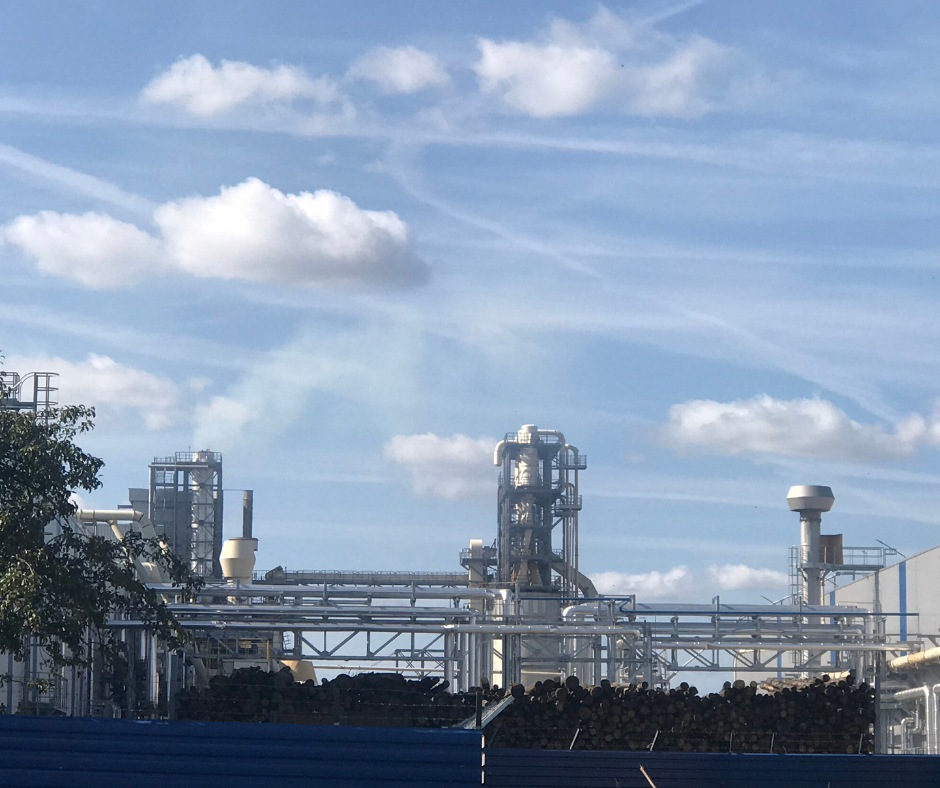For years, the interests of large corporations and businesses in Ukraine have been prioritized over the health of people and the environment. Permits for factories and enterprises are issued without careful analysis based on the principle of “economy first”: job creation is a way to fill the community budget.
This is evidenced by the work of the Kronospan Rivne woodworking plant and the Kolor S.I.M. paint and varnish company in Rivne region, which received permits despite incomplete information in their environmental impact assessment reports (EIAs). This is all due to imperfect legislation, which is skilfully used by investors.
Austrian investor versus activists: who won
In 2019, the Kronospan woodworking plant near Rivne announced the start of construction. Local residents protested against the plant because they were concerned about the amount of emissions of harmful substances that the investor had directly mentioned. For criticising their activities, Kronospan sued activist and ATO veteran Andriy Ovsiychuk and demanded 150 000 UAH in compensation. That means the public was not even allowed to express concerns about possible dangers.
Environmentalists from Ecoclub analysed the environmental impact assessment report for the future plant. We found out that the plant will release nine times more formaldehyde into the air. This is a carcinogenic substance that can cause cancer and respiratory diseases. In other words, the plant directly indicated that its emissions of harmful substances will be exceeded during operation. In addition, the report contained inaccurate information about the state of the water in the Ustia River. The report’s authors claimed that there was more water in the river near the plant and that it was cleaner than reported by the Department itself. This was one of the manipulations that allowed to give the positive conclusion for the operation of the plant. The developers also did not calculate the impact of all air pollutants on the health of the local population.
Ecoclub participated in public hearings on the report and was also sued by Kronospan for its criticism. The litigation lasted for a year. The environmentalists won the case in the Supreme Court.
Afterwards, Ecoclub filed a lawsuit against the Department of Ecology and Natural Resources of the Rivne Regional State Administration, which issued a positive EIA conclusion on Kronospan. The litigation lasted about two years, and the environmentalists later lost in the Supreme Court. The court found no violation of the law by Kronospan and did not overturn the conclusion. The plant developed a new report, which took into account previous public comments, but left inaccurate calculations. In particular, it contained contradictory information about the amount of waste to be generated during preparatory and construction work, unreliable information about noise pollution, and undetailed description of the environmental impact of the alternatives. So now the plant is operating.
Kronospan is an international woodworking corporation. Since 2005, it has been operating in Ukraine, in the city of Novovolynsk (Volyn region). Local residents have repeatedly complained about the unpleasant smell caused by excessive air emissions. In 2020, during an unscheduled inspection, the State Environmental Inspectorate found significant violations at the enterprise: the fine for environmental damage amounted to 300 thousand of hryvnias.
Paint and varnish company poisons residents of Klevan
Another example is Kolor S.I.M., a paint and varnish company in Klevan (Rivne region). Residents have repeatedly protested against its operation: they picketed, blocked the road, and complained to the environmental inspectorate. The reason for this is the chemical smell that causes headaches, dizziness and poisoning.
During the production of varnishes and paints, Kolor S.I.M. emits carbon monoxide, toluene vapours and other harmful substances. Prolonged inhalation can cause cardiovascular diseases, liver and circulatory system diseases, and increases the risk of miscarriages. Statistics show that the prevalence of diseases of the endocrine system (hormonal disorders), blood and hematopoietic organs, nervous system, circulatory system and respiratory organs is ten times higher in Klevan than in other cities.
| Disease prevalence rates (number of complaints per 10 thousand people). | Klevan | Zdolbuniv | Rivne |
| Endocrine system diseases | 13 455,7 | 2 015,2 | 1 704,4 |
| Blood and blood-forming organs diseases | 1 698,6 | 228,4 | 160,3 |
| Nervous system diseases | 4 220,0 | 1 057,0 | 730,4 |
| Circulatory system diseases | 33 471,4 | 6 238,3 | 3 588,8 |
| Respiratory diseases | 37 588,6 | 5 698,7 | 4 981,9 |
Comparison of diseases in Klevan, Rivne and Zdolbuniv in 2022. Source: Regional Information and Analytical Centre for Medical Statistics of the Rivne Oblast
For a long time, the company had been operating without a permission to emit 30 harmful substances. The State Inspectorate of the Polissia District discovered this in 2020 and filed a lawsuit. In May, the court partially suspended Kolor S.I.M.’s operations. The company began a new EIA procedure. Local residents, together with NGOs, submitted about 100 pages of proposals for the work of Kolor S.I.M. However, once again, people’s opinions were not taken into consideration. Instead, the Ministry of the Environment created its own list of conditions that the company must fulfil before starting operation.
These conditions are controversial because not all of them have a deadline. According to them, only the authorities will decide how to implement them. Therefore, the public will have no open access to information before final decisions are made.
Currently, Kolor S.I.M. is waiting for an emissions permit. If the State Service of Ukraine for Food Safety and Consumer Protection allows it to be issued, the company will continue to operate.
Complaint to the Aarhus Convention Committee
Based on the examples of Kronospan and Kolor S.I.M., Ecoclub sees that the EIA system in Ukraine does not fulfil its function – it does not take into account public opinion, and Ukrainians have to defend their right to criticise polluters in courts.
To fill in the gaps in the legislation, Ecoclub appealed to the Aarhus Convention Compliance Committee. It protects the right of people to live in an environment that is safe for human health and well-being.
In the spring of 2023, the Aarhus Committee accepted the Ecoclub’s complaint for consideration. It had clearly seen that during the EIA and strategic environmental assessment procedures in Ukraine, the opinion of the public is not always taken into account properly.
To prevent companies from poisoning communities, it is necessary to patch holes in the procedures
There are many gaps in the law now, so businesses can easily avoid it. For example, the public does not always have a voice in the early stages of decision-making. In the case of Kronospan, a permit for preparatory construction work can be issued even before public discussions of the detailed site plan (DSP) and strategic environmental assessment (SEA) are held. Similarly, the plant may start building ancillary facilities, such as warehouses, access roads, etc., even before the EIA and SEA.
The law provides a norm on geographical alternatives. This is a requirement to consider several sites for development before the start of permitting procedures. However, it is difficult to implement in practice, as an investor will not rent or buy two or more alternative sites.
The local authorities represent the interests of business rather than the public. Local authorities encourage business development and at the same time are responsible for permitting procedures. This was clearly the case with Kronospan: The Rivne Regional State Administration, which is interested in attracting investment, issues an order to sell a land plot for investment projects. And its subordinate Department of Ecology must ensure access to information and public participation in decision-making on the implementation of these projects. It should also carry out EIAs, analyse the harm to the environment and people from the investor’s actions.
Confusion in the sequence of legislative processes also arises from the insufficient interconnection between EIA and other related procedures (SEA, detailed site plan, and construction permits). These procedures are carried out inconsistently: a construction permit can be obtained during the planning of urban planning documentation or SEA.
In the case of Kronospan, after acquiring the plots, they simultaneously developed a detailed site plan, a SEA, an EIA report, and carried out preparatory construction work. As a result, they received a construction permit. That is, even during the planning and public hearings, Kronospan began preparatory construction work.
What EIA system should be in Ukraine
Ukraine is on its way to the EU, so now is the best time to reform its environmental impact assessment legislation. It must comply with European standards (Directive 2011/92/EU) not only on paper, but also become efficient and transparent, and ensure public participation at the earliest stages. Otherwise, the European integration process will be delayed, and investors will continue to poison communities.
Therefore, Ukrainian legislation needs to be changed, and:
– Provide free access to the documents of the environmental impact assessment register for all citizens. In particular, to the materials of post-project monitoring, actual indicators of monitoring observations. The public should be able to monitor the current state of the environment and the possible impact of enterprises on their health.
– Implement screening (selection of projects that should undergo EIA) at an early stage to identify low-risk projects.
– Ensure the institutional capacity, openness and accessibility of regulatory authorities, accredited certified contractors, and laboratories.
– Hire a sufficient number of qualified personnel in the structural units of the authorised bodies (the Ministry of Ecology or the environmental departments of local administrations) dealing with EIA (depending on the workload and the number of EIA conclusions prepared). Continuously improve the qualifications of employees (training courses related to environmental protection, sustainable development, and best available technologies).
– Assign responsibility for the prepared EIA report to the executors.
What is next
If the Committee decides that Ukraine is not in compliance with the Convention, the Government of Ukraine may receive a warning and a request to bring its national legislation and practices into line with the provisions of the Convention.
If Ukraine fails to comply, the Meeting of the Parties may suspend special rights and privileges under the Convention, which would clearly be a serious and lasting obstacle to EU accession.
The article was published within the framework of the project “Closing the Loop: A Just Energy Transition Designed by Cities and Regions”, implemented with the financial support of the European Union. Its contents are the sole responsibility of NGO Ecoclub and do not necessarily reflect the views of the European Union.












